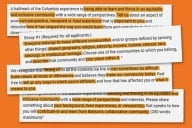You have /5 articles left.
Sign up for a free account or log in.

Workforce simulations help prepare students for entry level jobs or internships after college.
AzmanL/E+/Getty Images
Internships and experiential learning are among the top ways to build students’ career skills while in college, but not every student has the time, resources or capabilities to participate in long-term or in-person experiences.
Students at Stony Brook University, part of the State University of New York System, can gain professional skills and connect with employers through the Forage platform, building their resumes and revealing career paths with top employers around the world.
Through short, virtual simulations, faculty and staff members introduce students to various career competencies and job roles, which assist in their career development and benefit their student success after college.
How it works: Forage is an online platform that offers virtual experiences designed by corporate partners. Each experience is free for the user and the university, paid for by the business partner who creates the simulation, such as Citibank, Goldman Sachs, KPMG or Lululemon.
Simulations range from cybersecurity for JP Morgan Chase and Co to facilities management for CBRE or data science for British Airways.
Students work through tasks that simulate work they might complete as an entry-level employee or intern. The simulations take between three to eight hours to complete, and students work through them at their own pace. Upon completion, students earn a certificate.
The instructor platform on Forage allows professors to monitor students’ progress and participation.
Students gain deeper connections to potential employers as well. The platform serves as a recruiting tool, exposing students to available roles at the company, but also demonstrates students’ competencies even before they are hired.
Forage data found 20 percent of participating employers’ early-talent hires are former “Foragers,” as student users are called, and hiring managers are more likely to consider students who use the tool, opening doors for students.
Integrating tech: Stony Brook first adopted Forage during the COVID-19 pandemic, recognizing students were limited in their experiential learning opportunities due to remote learning and related stay-at-home orders. Even with in-person activities back, the university is located on Long Island, which is 60 miles from Manhattan, making transportation a barrier for many students.
“Completing those simulations, Forage not only gives them skills, but recognition, experience and connects them with those employers that they wouldn’t otherwise be able to [connect with],” explains Urszula Zalewski, director of experiential education.
Faculty in the business school were early adopters, eager to introduce the tech to their students, and the school of health professions quickly followed. Over the past few years, Forage has been embedded into additional departments and courses, getting in front of hundreds of Stony Brook learners each year.
In fall 2023, more than 50 courses used Forage simulations, representing 30 faculty members and well over 100 students, Zalewski says.
How the simulation is used varies by the faculty member and the course. In the school of health professions, all seniors must complete a simulation in their capstone course, then complete group discussion to reflect on the experience and tie it into their future career, Zalewski says.
More recently, Forage simulations were adopted into student employment trainings for some jobs at Stony Brook and integrated into the syllabi of internship courses, impacting 1,000 students who participate in internships each year.
Participant surveys at Stony Brook found 90 percent of students see value in the experience, as well.
“This is the future of how education will be delivered,” says Marianna Savoca, associate vice president for career readiness and experiential education.
Scaling up: Marketing and enrollment service provider EAB acquired Forage in April, with plans to embed the platform into Navigate, EAB’s student success management system.
With the integration, any student using Navigate can access Forage, expanding access to both the simulations and employer connections.
At Stony Brook, administrators don’t anticipate the integration to impact students’ access significantly, but Savoca sees potential for data integration between the two platforms, helping leaders identify how students’ outcomes vary if they do or don’t use the tool.
In the future, Stony Brook leaders hope the platform will expand the simulations available, increasing offerings for students looking to pursue nonprofit or research roles, for example. In the meantime, staff are partnering with faculty to help them identify similar positions that could equip students with skills for their future careers from current offerings
If your student success program has a unique feature or twist, we’d like to know about it. Click here to submit.



